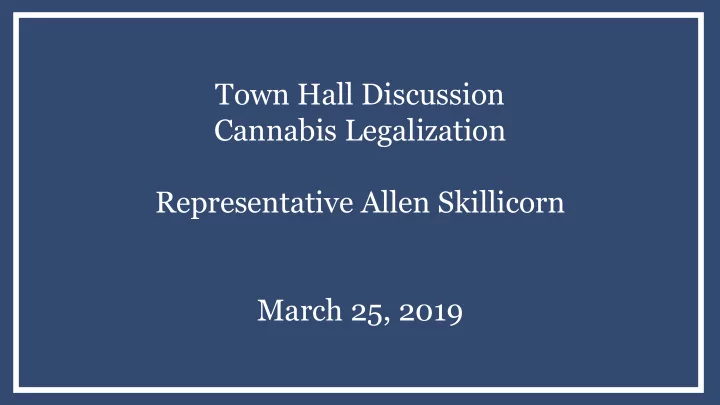

Town Hall Discussion Cannabis Legalization Representative Allen Skillicorn March 25, 2019
Why Legalize ? Prohibition has simply not worked. Use of cannabis is mainstream and widespread. 22 million Americans currently use and 100 million have tried. 780,000 Illinoisans report past-month use. Data from other states shows that usage rates do not increase following legalization.
Why Legalize ? Youth access needs to be addressed . • 4 out of 5 teens report cannabis is fairly or very easy to access. • Legalized states have not seen an increase in teen use. • Study after study confirms legalization is not tied to increased rates of teen use. • Most legalization states report a decrease in teen use. Restorative Justice to the communities disproportionately harmed by the War on Drugs needs to happen.
Current Cannabis Law in Illinois: • Medical Cannabis – 2015 The Medical Cannabis Pilot Program has issued more than 52,000 patient cards for 41 approved conditions. • Decriminalization – July 2016 Possession of less than 10 grams of cannabis is a civil offense with a maximum fi ne of $200.
Illinois Medical Cannabis Pilot Program 21* Indoor Cultivation facilities • One per Illinois State Police district 60 * Medical Cannabis Dispensaries • Distributed throughout state roughly by population *Not all licenses operational
Proposed: Tax and Regulate Adult-Use Cannabis • Illinois residents age 21+ may purchase/possess 30 grams (1 oz). Non-residents are limited to 15 grams. • Adults (21+) may indoor cultivate up to five plants per household. • Public consumption of cannabis, including driving while under the influence of cannabis remains illegal. • Municipalities and local jurisdictions will have the ability to control the scope of the industry in their communities.
Proposed: Tax and Regulate Adult-Use Cannabis • Employers and landlords may adopt a zero-tolerance drug policy. • Cannabis businesses must abide by rules for packaging and advertising. Labeling assures safety with seed to sale tracking and product potency information.
Revenue Projections • Need to be mindful not to overtax. • Illinois Economic Policy Institute – 2018 report o Cannabis will generate $525 million in new tax revenue. o Cannabis will create nearly 24,000 new jobs in 2600 businesses.
T ax and Regulate Adult-Use Cannabis (cont.) Revenue from cannabis sales will go to: • Support public education campaigns; • Mental Health/Substance abuse treatment; • Programs to repair harms to communities adversely affected by the War on Drugs; • Law enforcement impairment training.
T ax and Regulate Adult-Use Cannabis (cont.) DUI – Cannabis No changes to existing DUI laws in Illinois. Current IL statute permits: • NHTSA standardized field sobriety tests (FST) . • Transportation of product must be in non-odor emitting, unopened, sealed container; • Testing of bodily fluids and mandated per se limits of THC. Revenue for Law Enforcement will support: - DRE certification - “Breathalyzer” type technology.
Avenues for Restorative Justice 1. Expunge Criminal Records 2. Modify the current structure and requirements of cannabis business licensing. 3. Create the Restoring Our Communities Program - ROC 11
Avenues for Restorative Justice 1. Expunge criminal records • The law will mandate Expungement of prior convictions for individuals who have been convicted of a class 4 felony or any misdemeanor violation of the Cannabis Control Act. • Prior expungeable convictions for possession will not prohibit ownership of or employment in the cannabis industry. 12
Avenues for Restorative Justice 2. Modify Current Licensing Structure • Expand Illinois’ medical cannabis industry by adding more categories of license. • These will have varying points of capital entry and will give victims of the War on Drugs the opportunity to access and participate in this nascent cannabis industry. Craft Grower Processor/Infusion Transporter 13
Avenues for Restorative Justice 2. Modify Current Licensing Structure (cont.) • Hold current industry accountable. Must demonstrate equity and inclusion and contribute to the development of minority owned enterprises. - Business incubation - Job Fairs - Mentoring • Applicants for license must have a Community Benefits Program . Example: commit to use BEP contractors, foster local ownership, document diverse hiring practices, employ ex-offenders, conduct diversity training, operate in or support disadvantage communities. 14
Avenues for Restorative Justice 3. Create Restoring Our Communities Program – ROC • Focus assistance to those subject to violence, economic disinvestment and historical overuse of criminal justice responses. • Needs will be determined at the local level. • Communities that opt out of the industry will not be eligible for ROC funds. 15
Next Steps • File a revised, Illinois-centric • Determine optimal tax strategy bill that reflects the feedback to eliminate illicit market and received over the past twenty- minimize effects of price three months. compression and market fluctuation. • Create a timeline for implementation that ensures a • Decide final allocation and smooth rollout and thoughtful distribution of revenue. expansion of production and distribution.
Resources Thank you for participation in this important discussion. To remain updated on the legislation or to indicate your support, please visit: The Coalition for a Safer Illinois – www.SaferIllinois.org • Facebook: @SaferIL • Twitter: @Safer_Illinois • Email: info@Saferil.org To get accurate information and data about cannabis, please visit: The Marijuana Policy Project – www.mpp.org Chicago NORML – www.chicagonorml.org Illinois NORML – www.norml.org
Recommend
More recommend